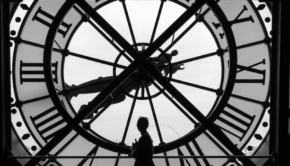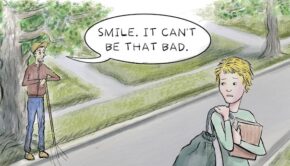The Self-Loathing Mother
The baby is asleep on my shoulder and I’m visibly crying when my partner walks into the room. We conduct a rapid pantomime in which I communicate that, one, these tears are happy, not sad, and two—of primary concern to him—he is not the cause.
We’re visiting my parents and the baby is eight months old, which means we are still new to the exquisitely challenging enterprise that, it turns out, is co-parenting—a fact I somehow missed during the decade plus I spent in desperate search of someone with whom to parent.
But in this moment, my tears stem not from a disagreement over the baby’s iron intake or whether we need a playpen or what’s actually caused an unusually short nap, but from some sachirine elixir of joy, gratitude, and grief.
I wanted to be a mother for a long time.
And for a long time, not being a mother–being single, without kids–defined me.
I didn’t meet my son’s dad until my mid-thirties;since my college years, I’d conducted a quest for partnership that one might describe as manic, or frenzied, or reckless, or turbulent. It was also public: for a decade I published a blog about my dating life—one that a large internet firm, mostly mercifully, has since deleted. (Due not to content but the much more banal incidence of a failure to update my credit card.)
Being single—and aggressively dating—was my brand. A former boss once asked whether I was in a relationship; when I hesitated, he answered for me: “Of course not,” he said. “What would you write about then?”

When my son was three months I brought him from Minneapolis, where I live, to Brooklyn, where I grew up.
We stayed with my brother in Park Slope, a neighborhood notable for its density of strollers and the wealthy, mostly white families who pay poor, mostly Black and brown women to push them.
I’d hung out in the slope often. And I’m sure my perception of the place was warped, on this trip, by the fact that I now had a child of my own. Still, it felt extraordinary, surreal even: there were so many babies. So many babies.
I walked the sidewalks thick with UppaBabies (pushing my own UppaBaby, needless to say), and regarded these other parents, gathered outside cafes and along the curved walking paths of Prospect Park, with disdain. I felt a physical repulsion.
Here’s the thing: I have delighted in motherhood. Before my kid, I knew next to nothing about babies, and now find myself gripped by his peculiar developments: learning to grasp a rattle, discovering the sound “baa,” finding an affection for limes and the fur of our family dog. I’m not sure you can be a conscious person in this decade and avoid some ambivalence about creating new life, but I harbor zero regret.
That night I was crying because the experience of being a mom is one I knew I wanted and was never sure I would have. The weight of my sweet baby’s sleeping head on my shoulder is a bliss I might easily have missed.
So why, then, as someone who delights in having a child, do I regard others who made the same choice as me—one that the majority of American adults still do—with such scorn?
Like all judgements projected outward, it’s obviously an expression of contempt I hold for myself. But why should I loathe myself for something I love?

In her published-as-fiction-but-reads-as-memoir book, Motherhood, Sheila Heti delves into her indecision about whether to have a child. Her search for a good reason supposes that there is one—a premise with which I’m pretty sure I disagree. But when I encountered her writings in my first months postpartum, she compelled me.
Heti names the choice to have a child as selfish. “When a person has a child,” she writes. “They are turned toward that child. The rest of us are left in the dust.”
That sentence kicked me in the gut.
I don’t like to complain about the consuming labor of parenting—and how little room it leaves for anything or anyone else—because it is work I chose. But I am angry about it: about the inhumane, unproductive number of hours we’re expected to work in our paid jobs, about the absurd cost of childcare, about the fact that healthcare costs anything at all, about the American ideal of isolated nuclear families that disconnects us from inter-generational care and wisdom and compels us to seek parenting knowledge from Instagram I’m angry that I could easily fill the few hours in which I’m not doing paid labor or unpaid parenting or household chores with online sleuthing for the vegetable, grain, or sippy cup least likely to poison my kid with lead.
In short, I’m mad at what bell hooks termed imperialist white supremacist patriarchy. Or what Cedric Robinson calls racial capitalism. Or oligarchy. Or whatever you want to call a system that compromises basic rights for the majority to enable the prosperity of a rich and powerful few.
I’m also ashamed, and sad: that my effort to live in community—the only sensible context to raise children—didn’t work out. That I insisted on having a kid anyway. That, in spite of my abundant privilege, I don’t make the time to resist our violent systems as much as I should—as much as other parents, even those with far fewer resources, can and have and do.
Shame that, in the collective eye, being a mom gives me a pass.
In Motherhood, Heti’s partner, Miles, questions why we revere the work of parenting: “Of course raising children is a lot of hard work,” Miles says. “But I don’t see why it’s supposed to be virtuous to do work that you created for yourself out of purely your own self-interest. It’s like someone who digs a hole in the middle of a busy intersection, and then starts filling it up again, and proclaims: Filling up this hole is the most important thing in the world I could be doing right now.”
I’m not sure parenting is quite as idle as filling a self-made hole, but Miles’ comment resonates nonetheless: never have I received more affirmation than since being pregnant. I went from society’s least valued member—a childless, unmarried woman—to among its most: a mother.
And perhaps what triggers most shame of all is how much I enjoy this. I like positive attention. I like the warm looks strangers share as I pass them with my charming baby, cute mutt alongside for added points. I like that I finally feel whole in the context of my family—whose members made no secret of eagerly awaiting this event.
I don’t want to validate the view that I’m more valuable because I’ve had a child. But by allowing myself to relish the affirming attention, isn’t that exactly what I’m doing?
Worse, isn’t it exactly what I’ve always done?

My friend R and I sit beside a wading pool in South Minneapolis. It’s a 90 degree August evening. She’s there with her toddler and five month old, I’m there with my babe, now eight months.
She and I first met at a coffee shop in Brooklyn, about ten years ago. I had recently moved back to New York after three years out west earning a master of fine arts in writing, and she had moved there from Minnesota, where she grew up, to pursue acting. I was applying for arts residencies, stringing together freelance jobs, dating a philandering gastroenterologist who moonlighted as a jazz musician. She was waiting tables at a trendy hotel in Chelsea and acting in avant garde theatre. We both have thick black hair and stereotypically Jewish features. People mistake us for sisters.
Soon after we met both of us followed boyfriends to the Twin Cities with whom we quickly broke up; we were in our early thirties—a time when the pressure mounts on women to settle with an imperfect partner for the sake of a family. Neither of us could make this choice.
Instead, we dated and built up independent lives. She started her own business and created a network of women entrepreneurs. I taught writing at colleges and prisons and founded a reading series; became politicized and got involved with justice work. I was almost always on the dating apps; she resisted them but reliably found men to date when she wanted.
“Who would’ve thought,” R says now, shaking her head as we gaze at our kids by the pool. “Us here with our babies.”
“I know,” I reply.
“I miss it so much,” she says. She’s talking about the identity of being single.
“Oh,” I reply. “I really don’t.”
She’s trying to be nice. “You rocked being single!” And then, because she is real like that, “Yeah. I don’t know that you enjoyed it.”
There was much to enjoy. I dated a celebrity’s ranch hand and a successful LA music producer. I had empowering encounters, deep friendships. I did a good job of making it look like I was enjoying myself; in many moments, I was. But my joy was always limited by yearning: for a stable partnership and a family of my own. And, a cloying preoccupation with how others perceived me.
When I encountered new parents during that time—on the street or in social media posts—I felt hostility of a different flavor: envy.

“You can’t make someone live to resolve a debate in your mind, or because you are curious for every human experience, or to fit in with your friends,” Heti writes.
But of course, that’s exactly what many of us who choose to have children do: we do it because we want an experience. It is selfish, and it’s also human.
I don’t like to admit feeling regret because it’s so useless. Where’s the good in wishing you’d made a different choice when the options are no longer there?
But our feelings aren’t always helpful. And the unhelpful truth is that I do regret how focused I was on what I didn’t have. I regret that I couldn’t enjoy that time as a single woman more.
I regret that it took having my son to make me feel worthy of being his mother.





One Response to The Self-Loathing Mother